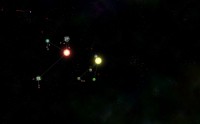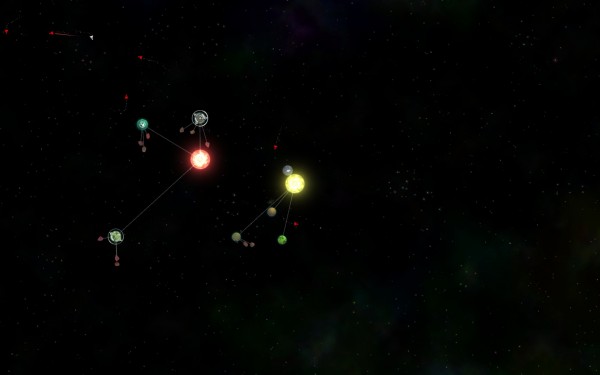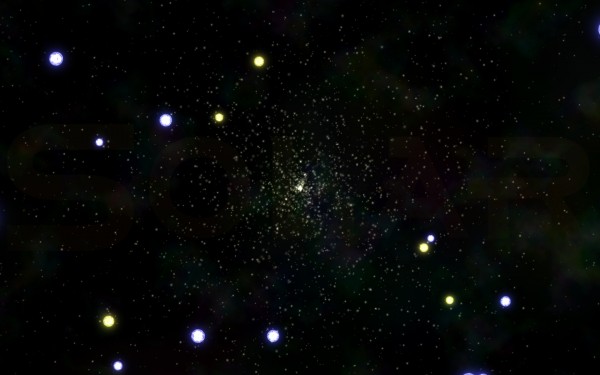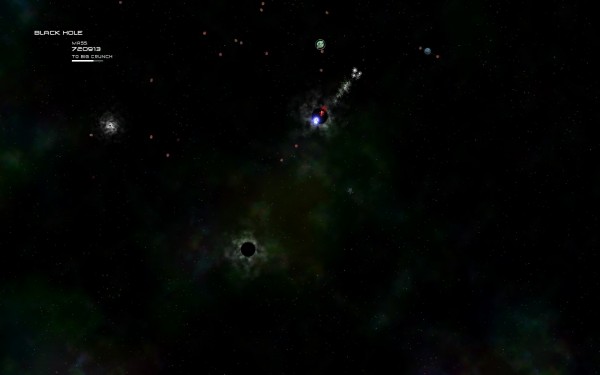Think back to when you used to play Grand Theft Auto 2 until the wee morning hours: did you, in the midst of the intense bloodshed and reckless sidewalk surfing, ever think to your past self, “Self, this game would transcend to true greatness, if and only if it were set in space, and I were playing as an asteroid instead of a ne’er-do-well”? If that thought has burned ever-bright in the back of your brain for the last 12 years, the moment you have been waiting for is here, for Solar 2 fulfills that dream.
Indie PC game Solar 2 plays like the spawn of a top-down GTA and classic arcade game Asteroids (with a dash of Osmos), offering the player the chance to ascend from a puny rock floating in the frigid void of space to a mammoth black hole that consumes the entire galaxy. I find a subtle satisfaction in simply putting about its vast, randomly-generated smattering of various satellites, planets, and stars, most of which can be absorbed if you so desire, you monster. After a couple hours of exploring the great expanse, I feel a weighty sense of accomplishment in becoming “The Big Crunch,” sucking all known matter into my core, before everything cycles back to the way it was before. There’s something philosophical tucked away in the structure, a sense of existing in a universe much bigger than myself.
While becoming the biggest, baddest concentration of matter in the universe is an enjoyable affair, the game never pushes or forces you in that direction, granting certain advantages to the self-controlled player who can resist the temptation to absorb all in his path. Acquiring multiple life-infested planets to surround your star lets you morph into a gargantuan destructive force as the planets’ automated starfighters and defensive guns destroy anything in your path. Multiple, tiered objectives are dangled as goals to pursue, with failure resulting in nothing but a slap on the wrist, the game respawning you in your previous, unscathed state.
In some sense, Solar 2 is the ultimate sandbox game, never punishing or poking or prodding the player for not going The Right Way or The Intended Route. Each stage of your object’s evolution plays like a different mini-game; though all are united cohesively by the underlying physics-based mechanics, subtle differences emerge: as an asteroid, you must gobble up your peers; as a planet, you must synchronize your movements with the asteroids so as to attract them into orbit and munch them up; as a star, you’ll become slightly slower and more lumbering, but with the added advantage of harboring multiple life-bearing planets in your arsenal.
PC gamers will be glad to hear that menus are no-nonsense, and a simple save-anywhere system allows players to store their galactic bodies in various states of evolution. In fact, the game doesn’t even boot into the menu at all; one minute, you’re staring at your Windows desktop, the next you’re an insignificant speck hurtling through space. WASD and arrow keys, with an odd CTRL or spacebar press here or there, are all that is required to maneuver the galaxies of Solar 2.
There is no question: Solar 2 is a simple game—too simple, perhaps, for some tastes; all space combat is automated by your fleets of fighters, and the largest mass possible can be achieved in under an hour. If you are the type of gamer who needs goals, accomplishments, or resolution, this may not be for you. But if you want a game that encourages you to relax and mosey about without much fear of failure, though retaining some sense of structure and progression, Solar 2 is a great experience on virtually all fronts.
Platform: PC
Developer: Murudai
Genre: Top-Down Space Exploration
Time: 5-6 Hours for all missions, limitless sandbox
Gripes: Some modes a tad simplistic
Get it for the: Mesmerising gameplay and sense of progression.
Full disclosure: PXOD was given a PC review copy of the game from the developer. Game was played for several hours.



